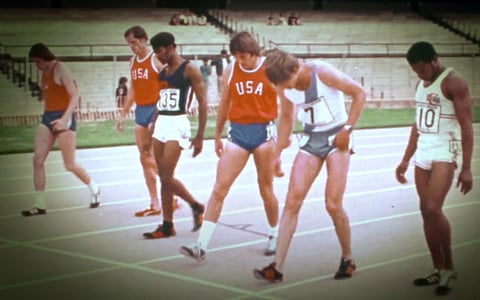
- Reviews
- Power List 2024
- Cannes 2024
- In-Depth Stories
- Web Stories
- News
- FC Lists
- Interviews
- Features
- FC SpecialsFC Specials

Director: Crystal Moselle
Streaming on: Netflix
The third segment of Untold, a five-part Netflix docuseries from the creators of Wild Wild Country, adopts a telling structure. More than two thirds of Untold: Caitlyn Jenner is about an athlete's dogged pursuit of greatness. The 1976 Montreal Olympics is the rousing centerpiece of the story. The opponent is an invincible Russian, too. But it would be erroneous to call this a "sports documentary".
Based on the life of arguably the most famous trans woman in the world, Untold: Caitlyn Jenner reveals sport as the ultimate medium of human conflict. While most people strive to locate an identity through the triumphs and tragedies of sports, the 70-minute documentary is based on a person who located a sport to escape the triumphs and tragedies of personal identity. Most of us know Caitlyn Jenner for who she is today. But Untold traces the origins of her current narrative back to the champion – of suffering, pain and desperate masculinity – she once was. No, not her time on reality series Keeping Up With The Kardashians. But further back: her time as a professional decathlete named Bruce Jenner, a boy who willed his world-beating body into distracting himself from the deep-rooted trauma of gender dysmorphia.
Jenner speaks of her previous life with disarming candour. We see a lot of her extraordinary past – Bruce's personality, uncertainty, love and obsession – framed as a consequence of ordinary emptiness. I'm consistently amazed by the agency of families who record their early years, almost as though they expect the home-video habit to come in handy for future biographical accounts. Even the melancholic zoom-ins are dramatically timed. When spliced together these grainy images attain a kind of profound prescience, like a snapshot of feelings hidden in broad daylight. I'm not sure there was enough footage from the family upheavals, subsequent divorces and intense confessions, which is why we also look for the story on the solemn faces of those mellowed by time: an older son, a former wife. When the son speaks, it's moving to see that he's still not used to the new pronouns; he deadnames his father out of both hope and habit, simultaneously respecting our urge to understand his politically incorrect emotions.
While Caitlyn skims over the four decades in between the Olympics and her belated transitioning, the documentary is defined by a desire to find answers in the anatomy of the sport she chose as a confused youngster. Over the course of the film, it becomes apparent that the detailed telling of Bruce's gold-winning performance in Montreal exists as a subtextual device for two things. One, to drive home the limitless endurance of a mind that took decades to accumulate the courage of authenticity. And two, to reveal just how far a human can go to reverse-fit the societal perceptions of "normalcy" and success. Equipped with the luxury of hindsight, Caitlyn Jenner is self-aware about her glory days. About the fact that she may have been punishing her body for harbouring strange instincts. Some of the staging seems unnecessary though: A chunk of the screentime features Caitlyn reminiscing while getting her hair done in her bedroom. The symbolism is in your face. Another scene features her watching Tiger Woods winning his 15th major and embracing his son – a convenient moment to float the balance between immortal athlete and flawed human.
In between, however, Caitlyn seems to be joining some of the dots herself, perhaps realizing that it's no coincidence she chose to excel at the most brutal and exacting sport of all. The decathlon is the pinnacle of all-around excellence, consisting of ten different disciplines over the span of two days. Not a muscle is left unpunished. In a way, Jenner was avoiding her truth in ten different ways – she was sprinting, jumping, throwing, hurdling and running away from her truth in front of millions of adoring viewers, and being rewarded with a medal for it. It's a powerful metaphor, and one that Untold refuses to spell out.
In the process, the documentary embraces the age, wisdom and reflective nature of a 70-year-old Caitlyn, at once resisting crude judgment on her identity as a wealthy American father on a cringe-pop reality show. It's a noble decision, but also a potentially narrow one. Not because of the show itself, but because the makers miss the chance to explore the contradictions and complexities of a hardcore Republican trans woman navigating the policies of a transphobic Trump administration. It also overlooks her political aspirations, and by extension the troubled relationship between white privilege and liberal posturing. On the brighter side, Untold: Caitlyn Jenner ignores these dimensions altogether, not pretending to suggest anything more than an intimate awakening. The clarity of tone ensures that the viewer focuses on inclusion – both artistic and cultural – rather than the exclusion of external forces. As promised, it fixates on the untold rather than the familiar. The world can wait. Because for some, life itself is an extreme sport.